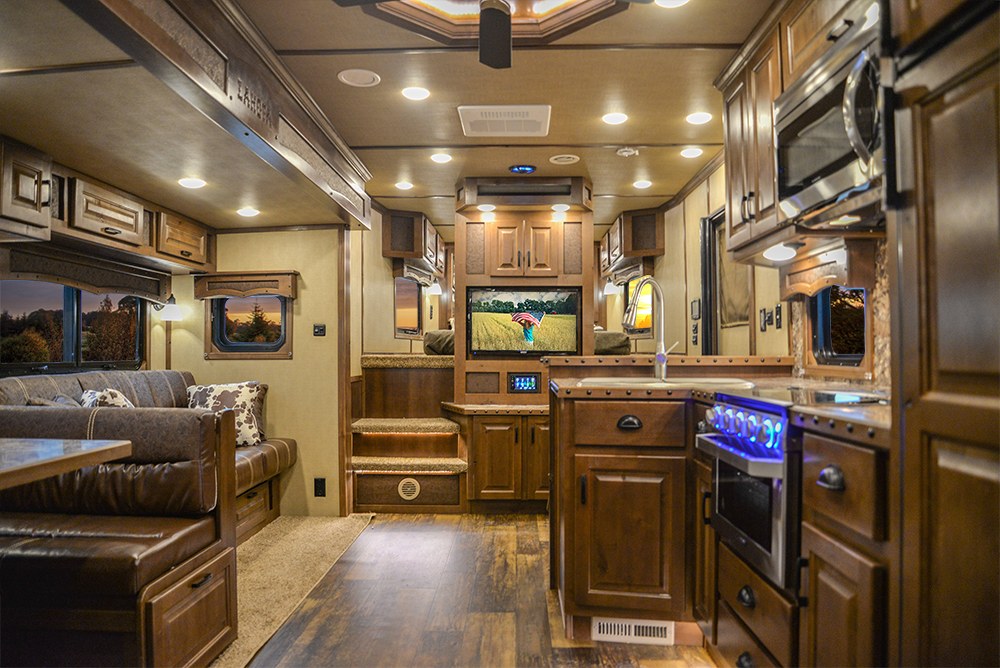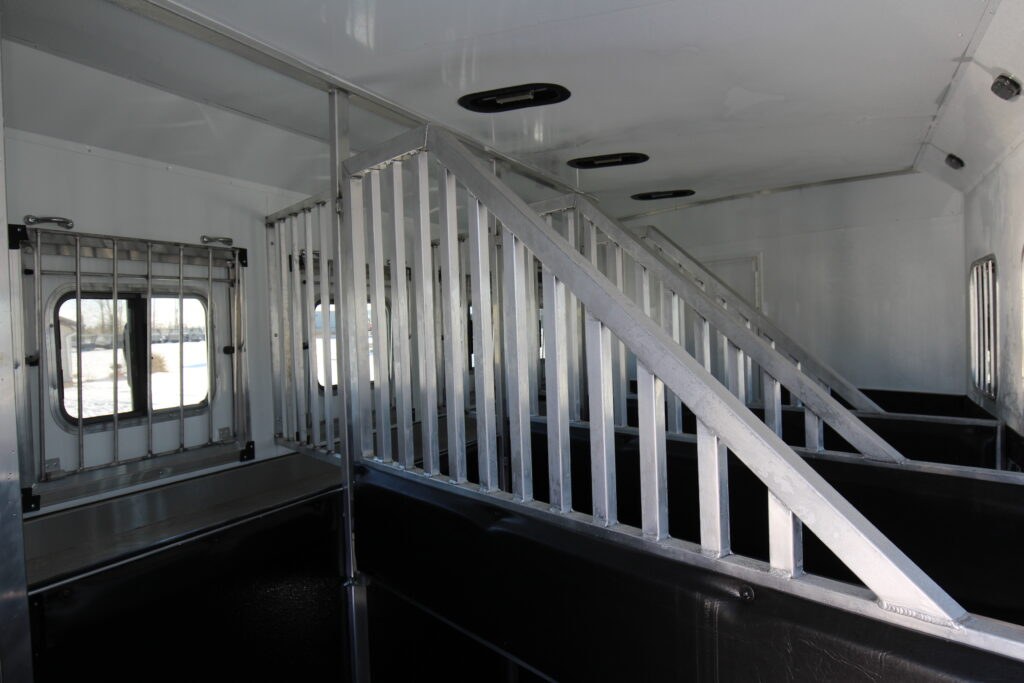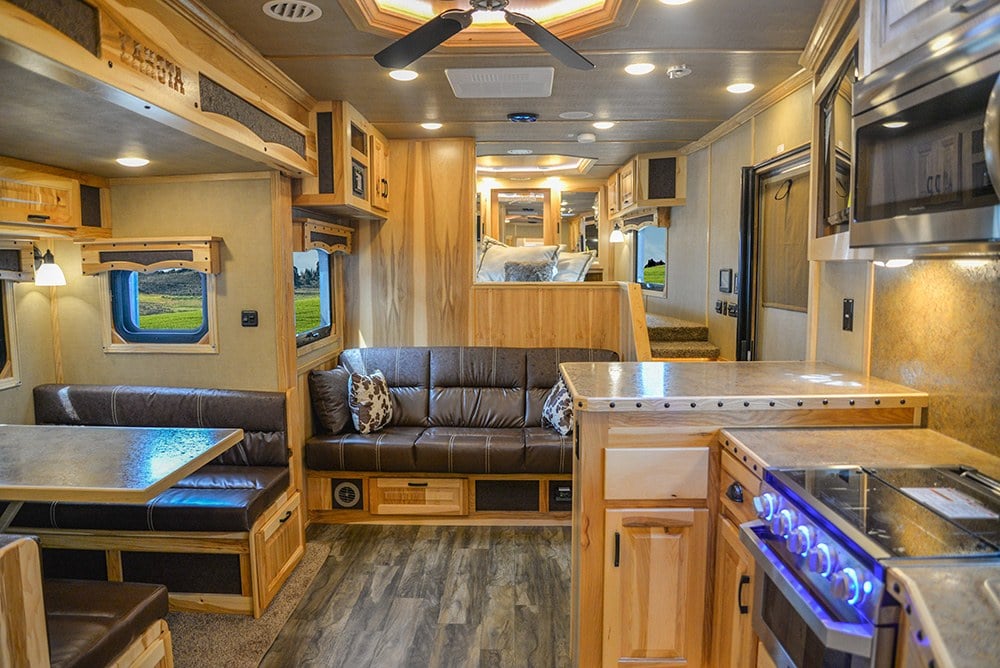At Vantage Trailers, we want to equip you with the information you need to make an informed decision. Buying a living quarters horse trailer can be a daunting task but we will break down the process, so that you feel confident that your decision is the right one.
Budget:
When deciding to buy a living quarters horse trailer for sale the very first consideration for most people is value for price and budget. There are many factors that go into this question. The biggest one that will affect the price of the unit is if you would like a custom built trailer. The number of manufacturers who build a very custom trailer is much more limited than those who build mainly standard trailers. Most manufacturers, however, can build almost anything that suits the majority of buyers. With dozens of floor plans to choose from and a host of other options, ranging from wall material to the style of fabric in the cushions, there is plenty of opportunity to make a trailer feel like the trailer has been customized for your personal taste.
Trailers which are finished by a conversion company, such as Trail Boss, Outlaw, or Outback, will be considerably higher in cost than those which are built in the one factory. This is not only due to the materials used for the interior, but also because of the shipping and handling of the trailer between different facilities. When a trailer interior is completed by a conversion company, the manufacturer and finisher need to work closely together to make sure all the placements and dimensions are exact. This involves more manpower, and thus more expense.
The materials used for the interior will also influence the price considerably. A standard living quarters may not use soft-touch walls, ceramic tile, real leather, nor hard wood flooring. It is up to each customer to decide what fits their budget, and if a trailer with vinyl flooring and wall board is adequate for their needs.
The size of the trailer is going to be a big factor impacting the overall cost. The larger the trailer, the higher the cost, of course. This goes for the interior of the trailer, as well as for the horse area. A trailer which is 8’ wide versus 6’9” will be more expensive as well, which is in part due to larger axles required.
The number and type of accessories/bling that the trailer has on it from factory will greatly determine the price of the trailer as well. A haypod and a generator setup can substantially impact the final price of the trailer. Aluminum rims will look better than plain steel rims (and don’t rust) but will cost more as well. A front enclosure to protect the batteries and propane tanks costs more, but worth it for appearance of the trailer over time, especially if you live on gravel roads.
Living Quarters Horse Trailer for Sale
Now that you have decided that a living quarters trailer is the right trailer for your needs, you have to decide what size of trailer is best for you. The first consideration is how many people need to sleep in the trailer. The bed area can sleep two people and the dinette can fold down into a bed for another person or two kids. If more sleeping space is needed, an additional couch will be ideal. This means that you will need a living quarters size that is at least 13’ to fit the couch and dinette. For larger families, bunk bed models may be the way to go.
Once you know the number of people who are going to be traveling with you, the next consideration is how long will the trailer be used at any given time. If the trailer is used just for weekend shows and all you want is a nice cold beer and a bed at the end of the day, a smaller LQ might work out just fine. If the LQ is going to be your home away from home for extended periods of time, we recommend getting one with more space for storage and comfort.
One consideration often overlooked is the ability to tow the trailer. If you can afford the biggest trailer in the lot but your truck can’t pull it safely or legally, we highly recommend downsizing to a more appropriate trailer or upgrading the truck. The way to know if the truck can pull the trailer is to look at the GVWR (Gross Vehicle Weight Rating) on the truck. Once you know the truck’s GVWR, add the weight of the trailer and the weight of all the horses, water, luggage, and hay to get the total weight of the trailer. Don’t forget that 25% of the total trailer weight is placed on the truck. There are many factors that influence the GVWR of the truck and the trailer, so we highly recommend talking to one of our experts to get more information on these factors and how they can effect what you can pull.

Horse area
The size of the horse area primarily comes down to the number of horses that need to be hauled. We generally recommend buying a trailer that has one more stall than the number of horses that will be hauled. This stall can be used as additional storage for hay, tack, buckets, barrels, or a mud room. If the trailer is going to be used for anything other than hauling horses, it is a good idea to figure out how much space is needed and buy accordingly. For instance, if the horse area is going to be used for a side by side or wagon, it is best to look at getting a livestock back for the ease of dual use. Livestock trailers with living quarters are becoming increasingly popular because of their adaptability. Livestock trailers are very versatile, and the number of horses that can be hauled is higher, while a large amount of hay or a quad can also be carried very effectively.
Storage space is a big consideration when purchasing a living quarters trailer because there are many options for additional storage and the placement of the storage. The horse area can be equipped with mangers that have storage underneath. This is a very handy use of the extra space. The size of the tack area is important especially when hauling many horses. Adding additional blanket bars, bridal bars, and brush boxes is a great idea. If a traditional tack area is not enough, a mid tack area might be a good way to go.

Build materials
When choosing to purchase a trailer, the materials that the trailer is made of will impact not only the price but also the weight of the trailer. An aluminum trailer will generally be lighter than a steel trailer but will cost much more. An all hardwood interior might be built rock solid but will also increase the weight of the trailer significantly.
Horse area floors are generally made of either aluminum or wood. Aluminum floors can corrode due to horse urine if not properly cleaned after use. Wood floors may let in a lot of dust when traveling on gravel roads. A WERM floor is an excellent addition as this protects the aluminum or wood floor, and does not allow urine to run through onto the substructure.
We hope this helps you make a more informed decision on your next purchase! Vantage Trailers has a variety of living quarters horse trailer for sale and we would be happy to sit down and help you find the best trailer!

